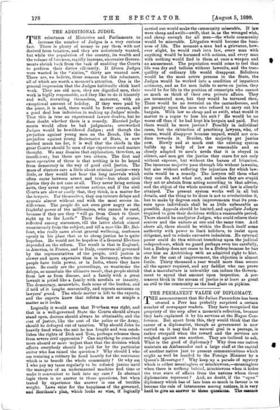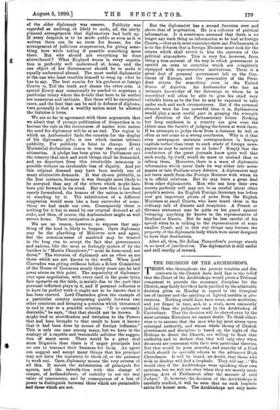THE PERMANENT VALUE OF DIPLOMACY. T HE announcement that Sir Julian
Pauncefote has been created a Peer has probably surprised a . certain number of newspaper readers. They .have recognised the propriety of the step after a moment's reflection, because they have explained it by his services at the Hague Con- ference. But apart from this, they would think that the career of a diplomatist, though as government is now carried on it may find its natural goal in a peerage, is rather overpaid when the reward and the services are weighed against one another. They are inclined to ask, What is the good of diplomady ? Why does one nation maintain an Ambassador and a large staff at the capital of another nation just to present communications which might as well be banded to the Foreign Minister by a Queen's Messenger ?. Why keep up a parade of mystery which is either meaningless or mischievous,—meaningless when there is nothing behind, mischievous when it hides the true state of affairs from the nations whom these diplomatists represent ? And, no doubt, if the "open" diplomacy which has of late been so much in favour is to become the rule of intercourse among nations, it is very hard to give an answer to these questions. The essence of the older diplomacy was reserve. Publicity wits. regarded as Undoing, or likely to node, all the nidely planned arrangements that diplomatists had built up. If every despatch is to be made public as scion ae it is written there can be no item for finesse; for the arrangement of judicious Compromises, for giving some- thing here while taking if possible something more there. But why should not everything be done abeve-Uard ? What England wants in every negotia- tion is perfectly well understood at home, and the one object Of her Government should be to make it equally understood abroad. The most useful diplomatist is the one who least troubles himself to wrap up what he has to say. The beet maxim for his guidance at foreign Courts is, Tell the truth and shame the other side. A speCial Envoy may occasionally be needed to negotiate a particular treaty where the details that have to be settled are numerous and intricate. But these will be eXceptienal cases, and the best that can be said in defence of diploma- tists generally is that a wealthy nation millet be allowed the hieuriee it loves.
We are so far in agreement with these arguments that we admit that if prompt publication of despatches is to become the rule in the intercourse of nation with nation the need for diplomaCy will be at an end. The region in which an Ambassador finds the occasion for the display of his diplomatic gifts is one which cannot tolerate Mblidity. For publicity is fatal to change. Every Ministerial declaration comes to wear the aspect of an ultimatUm. .A pledge has been given to Parliament and the eolintry that such and such things shall be demanded, and no departure from this ieredUaible minimum is possible without an intolerable loss of dignity. And yet this original .demand may have been merely one of many alternative demands. It was chosen probably, in the first instance, because it was thought more likely to be accepted than any of the others which might have been put forward in its stead. But now that it has been openly formulated, the honour of the nation is involved in standing by it. The substitution of a different suggestion would seem like a base surrender of some. thing we had made our own. Consequently there is nothing for it but to stand by our original demand at all risks, and then, of course, the Ambassador's might as well return home. Their occupation is gone.
We see no reason, however, to suppose that any- thing of the kind is likely to happen. Open diplomacy may be the plaything of Ministers now and again, but the common-sense of mankind may be trusted in the long inn to accept the fact that governments and nations, like the meat so feelingly spoken of by the butcher in "Martin ChUzilewit," " must be humoured; not drove." The victciries of diplomacy are as often as not these which are not known to the world. When Lord Clarendon was giving evidence before a Select Committee of the HOUse of Commons nearly thirty years ago he laid great stress on this point. The superiority of diplomacy over open negotiation, with every card in the game lying faCe upwards on the table, is mainly due to the part that personal influence plays in it, and if personal influence is to have its perfect work it ought not to be known that it has been exerted. Lord Clarendon gives the example of a particular Cenntry interposing quietly between two other countries and bringing a question which threatened to end in .war to a .peaCeftil solution. "It is extremely desirable,)' he says, " that that should not be known. It might lead to mortification and irritation to the Powers that had been brought to that result to have it known that it had been done by means of foreign influence." This is only One case among many, but we have in the analogy of a capable and reasonable solicitor the sugges- tion of many more. There would be a great deal more litigation than there is if angry principals had no one to transact their business for them. An agent can suggest and accept many things that his principal may not have the ingenuity to think of, or the patience to work out. Open diplomacy means the very reverse of all this. It means the substitution of principals for agents, and the introduction with this change of temper, of hotheadedness, of inability to see the real value of concessions, and by consequence of a loss of power to distinguish between those which are permissible and those which are net. • But the diplomatist has a second function over and above that of negotiation. He is a collector of political information. It is sometimes assumed that there is no longer any such thing as information to be had at foreign Courts,—that as in most countries there are Parliaments, it is to the debates that a foreign Minister must look for the straws which shall reveal to him the currents of the political atmosphere. This is very far, however, from being a true account of the way in which government is carried on even in Countries which are completely equipped with representative institutions. There is a great deal of personal government left on the Con- tinent of Europe, and the personality of the Presi- dent counts for something even in the United States of America. An Ambassador who has an intimate knowledge of the Sovereign to whom he is accredited will often be able to give his chief very valuable hints as to the line he may be expected to take under such and such circumstances. But if the personal element were far less powerful than it is, diplomatists would play a most useful part in gauging the strength and direction of the Parliamentary forces. Nothing but long residence in a country can give even the ablest man the faculty of judging the forces at work there. If he attempts to judge them from a distance he will as often as not come to a wrong conclusion. Why is it that even newspapers maintain correspondents in foreign capitals rather than trust to such study of foreign news- papers as may be carried on at home ? Simply that the conductors of the great journals know quite well that such study, by itself, would do more to mislead than to inform them. Moreover, there is a mass of diplomatic information which never finds its way either into news- papers or into Parliamentary debates. A diplomatist may not learn much from the Foreign Minister with whom he is in official relations. But he may learn a great deal from other diplomatists. Men who can keep their own secrets perfectly well may not be as careful about other people's secrets. An English Foreign Secretary has before now got important pieces of news from the English Ministers at small Courts, who have heard them in the ordinary talk of dinners and receptions. A French or German statesman may be quite on his guard against betraying anything he knows to the representative of England or Russia. But he may be less careful of his speech when he is talking to the representative of some smaller Court. and in this way things may become the property of the diplomatio body which were never designed to have that destination.
After all, then, Sir Julian Pauncefote's peerage stands in no need of justification. The diplomatist is still useful and still worthy of reward.



































 Previous page
Previous page